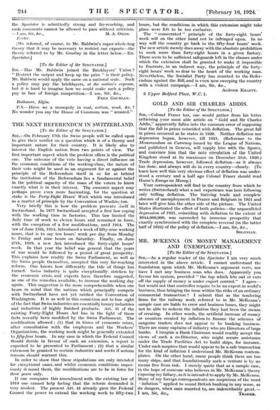MR. McKENNA ON MONEY MANAGEMENT AND UNEMPLOYMENT.
[To the Editor of the SPECTATOR.] Sur,—As a regular reader of the Spectator I am very much interested in the above article. I cannot understand the foundation upon which Mr. McKenna's argument rests, nor have I met any business man who does. Apparently you favour his system, provided "the tap which lets out or cuts off the supply of money is under expert control." I agree— but would not that controller require to be an expert in world's business, thus bringing the issue within the risks of an ordinary commercial transaction ? I submit that as the tendering firms for the railway work referred to in Mr. McKenna's sample case are liable to error and business losses, they might not be able to redeem the inflation they had been the means of creating. In other words, the artificial increase of money or counters created by inflation to finance the schemes of sanguine traders does not appear to be banking business. There are many captains of industry who are Directors of large banks. I imagine a Bank Chairman would readily accept the views of such a co-Director, who might secure assistance under the Trade Facilities Act, to build ships, for instance. Under such auspices that would appear to be a safe transaction for the kind of inflation I understand Mr. McKenna contem- plates. On the other hand, many people think there are too many ships, and that fotmdationally such a venture is by no means free from risk. I merely quote that as a sample case, in the hope of someone who believes in Mr. McKenna's theory exposing my fallacy, as it is intended to apply by Mr. McKenna. Many of my foreign.correspondents are suspicious of the word • inflation" applied to sound British banking in any sense, as its dangers, when once resorted to, are indescribably great.—










































 Previous page
Previous page